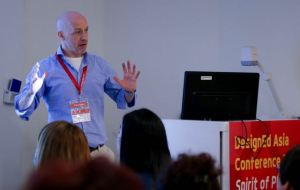How much of a child’s education should be considered creative? In England recent talk of the English Baccalaureat would suggest not much. Whilst the subjects within the EBacc can be and sometimes are creative – they are not your usual creative subjects (I know there will be disagreements with this). So the government would probably be indicating that about 20% should be given over to creative activities – perhaps one or two ‘ creative subjects’? Traditionalists may already be thinking that 20% is too generous and perhaps we could squeeze in a little more on the recall of facts, facts, facts.
But why the opposition to creative education – why isn’t there a massive call for more creative education and a reversal of the ratio with 80% creative education?
Well one reason is fear of the unknown – reproduction of existing privileged knowledge is much easier to conceptualise, manage, measure and be accountable for. If you want to measure and manage something then for goodness sake make sure it measurable and manageable – which is exactly what the EBacc is.
The problem with creativity is it is ill disciplined, difficult to manage, difficult to measure and difficult to conceptualise – particularly if you are not particularly creative. Creativity requires a leap of faith, it has to be risky and the returns from it can be low as well as high. So an education minster who stakes his reputation on Pisa and performance has to be back to basics even if that means an impoverished experience. And this is the same message that is translated through every school – why take a risk in providing a broad educational experience when a ‘schooling culture’ mitigates risk even if it is benign.
So as someone who believes in creative education I understand the reasons but don’t accept them as legitimate. Oliver Sacks talks about using music and the arts ( http://bcove.me/5yae5611 ) transforming lives and the medicating of notionally hyperactive children. In an education system (not a schooling system) that valued diversity, creativity, risk and uncertainty – would they still need to prescribe medication and exclude so many children?
Finally I mentioned in an earlier post that Churchill was asked to cut Arts funding during the war effort to which he replied : “Then what are we fighting for?” The same has to be said about education – if you cut creativity out of the curriculum – what are we educating for?

